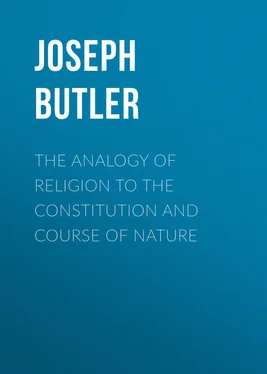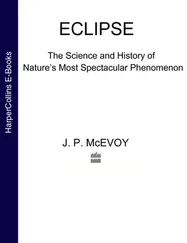Joseph Butler - The Analogy of Religion to the Constitution and Course of Nature
Здесь есть возможность читать онлайн «Joseph Butler - The Analogy of Religion to the Constitution and Course of Nature» — ознакомительный отрывок электронной книги совершенно бесплатно, а после прочтения отрывка купить полную версию. В некоторых случаях можно слушать аудио, скачать через торрент в формате fb2 и присутствует краткое содержание. Жанр: foreign_antique, foreign_prose, на английском языке. Описание произведения, (предисловие) а так же отзывы посетителей доступны на портале библиотеки ЛибКат.
- Название:The Analogy of Religion to the Constitution and Course of Nature
- Автор:
- Жанр:
- Год:неизвестен
- ISBN:нет данных
- Рейтинг книги:3 / 5. Голосов: 1
-
Избранное:Добавить в избранное
- Отзывы:
-
Ваша оценка:
- 60
- 1
- 2
- 3
- 4
- 5
The Analogy of Religion to the Constitution and Course of Nature: краткое содержание, описание и аннотация
Предлагаем к чтению аннотацию, описание, краткое содержание или предисловие (зависит от того, что написал сам автор книги «The Analogy of Religion to the Constitution and Course of Nature»). Если вы не нашли необходимую информацию о книге — напишите в комментариях, мы постараемся отыскать её.
The Analogy of Religion to the Constitution and Course of Nature — читать онлайн ознакомительный отрывок
Ниже представлен текст книги, разбитый по страницам. Система сохранения места последней прочитанной страницы, позволяет с удобством читать онлайн бесплатно книгу «The Analogy of Religion to the Constitution and Course of Nature», без необходимости каждый раз заново искать на чём Вы остановились. Поставьте закладку, и сможете в любой момент перейти на страницу, на которой закончили чтение.
Интервал:
Закладка:
It may not be amiss, once for all, to see what would be the amount of these emendations and imaginary improvements upon the system of nature, or how far they would mislead us. It seems there could be no stopping, till we came to some such conclusions as these: that all creatures should at first be made as perfect and as happy as they were capable of ever being: that nothing, surely, of hazard or danger should be put upon them to do; some indolent persons would perhaps think nothing at all: or certainly, that effectual care should be taken, that they should, whether necessarily or not, yet eventually and in fact, always do what was right and most conducive to happiness; which would be thought easy for infinite power to effect, either by not giving them any principles which would endanger their going wrong, or by laying the right motive of action in every instance before their minds in so strong a manner, as would never fail of inducing them to act conformably to it: and that the whole method of government by punishments should be rejected as absurd; as an awkward roundabout method of carrying things on; nay, as contrary to a principal purpose, for which it would be supposed creatures were made, namely, happiness.
Now, without considering what is to be said in particular to the several parts of this train of folly and extravagance, what has been above intimated, is a full direct general answer to it; namely, that we may see beforehand that we have not faculties for this kind of speculation. For though it be admitted that, from the first principles of our nature, we unavoidably judge or determine some ends to be absolutely in themselves preferable to others, and that the ends now mentioned, or if they run up into one, that this one is absolutely the best; and consequently that we must conclude the ultimate end designed, in the constitution of nature and conduct of Providence, is the most virtue and happiness possible; yet we are far from being able to judge what particular disposition of things would be most friendly and assistant to virtue; or what means might be absolutely necessary to produce the most happiness in a system of such extent as our own world may be, taking in all that is past and to come, though we should suppose it detached from the whole things. Indeed we are so far from being able to judge of this, that we are not judges what may be the necessary means of raising and conducting one person to the highest perfection and happiness of his nature. Nay, even in the little affairs of the present life, we find men of different educations and ranks are not competent judges of the conduct of each other. Our whole nature leads us to ascribe all moral perfection to God, and to deny all imperfection of him. And this will forever be a practical proof of his moral character, to such as will consider what a practical proof is; because it is the voice of God speaking in us. Hence we conclude, that virtue must be the happiness, and vice the misery, of every creature; and that regularity and order and right cannot but prevail finally in a universe under his government. But we are in no sort judges, what are the necessary means of accomplishing this end.
Let us then, instead of that idle and not very innocent employment of forming imaginary models of a world, and schemes of governing it, turn our thoughts to what we experience to be the conduct of nature with respect to intelligent creatures; which may be resolved into general laws or rules of administration, in the same way as many of the laws of nature respecting inanimate matter may be collected from experiments. Let us compare the known constitution and course of things with what is said to be the moral system of nature; the acknowledged dispensations of Providence, or that government which we find ourselves under, with what religion teaches us to believe and expect; and see whether they are not analogous and of a piece. Upon such a comparison it will, I think, be found that they are very much so: that both may be traced up to the same general laws, and resolved into the same principles of divine conduct.
The analogy here proposed to be considered is of pretty large extent, and consists of several parts; in some more, in others less exact. In some few instances perhaps, it may amount to a real practical proof; in others not so. Yet in these it is a confirmation of what is proved otherwise. It will undeniably show, what too many need to have shown them, that the system of religion, both natural and revealed, considered only as a system, and prior to the proof of it, is not a subject of ridicule, unless that of nature be so too. And it will afford an answer to almost all objections against the system both of natural and revealed religion; though not perhaps an answer in so great a degree, yet in a very considerable degree an answer to the objections against the evidence of it: for objections against a proof, and objections against what is said to be proved, the reader will observe are different things.
The divine government of the world, implied in the notion of religion in general and of Christianity, contains in it: that mankind is appointed to live in a future state; 13 13 Ch. i.
that there every one shall be rewarded or punished; 14 14 Ch. ii.
rewarded or punished respectively for all that behaviour here, which we comprehend under the words, virtuous or vicious, morally good or evil: 15 15 Ch. iii.
that our present life is a probation, a state of trial, 16 16 Ch. iv.
and of discipline, 17 17 Ch. v.
for that future one; notwithstanding the objections, which men may fancy they have, from notions of necessity, against there being any such moral plan as this at all; 18 18 Ch. vi.
and whatever objections may appear to lie against the wisdom and goodness of it, as it stands so imperfectly made known to us at present: 19 19 Ch. vii.
that this world being in a state of apostasy and wickedness, and consequently of ruin, and the sense both of their condition and duty being greatly corrupted amongst men, this gave occasion for an additional dispensation of Providence; of the utmost importance; 20 20 Part II. Ch. i.
proved by miracles; 21 21 Ch. ii.
but containing in it many things appearing to us strange, and not to have been expected; 22 22 Ch. iii.
a dispensation of Providence, which is a scheme or system of things; 23 23 Ch. iv.
carried on by the mediation of a divine person, the Messiah, in order to the recovery of the world; 24 24 Ch. v.
yet not revealed to all men, nor proved with the strongest possible evidence to all those to whom it is revealed; but only to such a part of mankind, and with such particular evidence, as the wisdom of God thought fit. 25 25 Ch. vi. vii.
The design then of the following treatise will be to show, that the several parts principally objected against in this moral and Christian dispensation, including its scheme, its publication, and the proof which God has afforded us of its truth; that the particular parts principally objected against in this whole dispensation, are analogous to what is experienced in the constitution and course of nature or Providence; that the chief objections themselves which are alleged against the former, are no other than what may be alleged with like justness against the latter, where they are found in fact to be inconclusive; and that this argument from analogy is in general unanswerable, and undoubtedly of weight on the side of religion, 26 26 Ch. viii.
notwithstanding the objections which may seem to lie against it, and the real ground which there may be for difference of opinion, as to the particular degree of weight which is to be laid upon it. This is a general account of what may be looked for in the following treatise. I shall begin it with that which is the foundation of all our hopes and of all our fears; all our hopes and fears, which are of any consideration; I mean a future life.
Интервал:
Закладка:
Похожие книги на «The Analogy of Religion to the Constitution and Course of Nature»
Представляем Вашему вниманию похожие книги на «The Analogy of Religion to the Constitution and Course of Nature» списком для выбора. Мы отобрали схожую по названию и смыслу литературу в надежде предоставить читателям больше вариантов отыскать новые, интересные, ещё непрочитанные произведения.
Обсуждение, отзывы о книге «The Analogy of Religion to the Constitution and Course of Nature» и просто собственные мнения читателей. Оставьте ваши комментарии, напишите, что Вы думаете о произведении, его смысле или главных героях. Укажите что конкретно понравилось, а что нет, и почему Вы так считаете.












